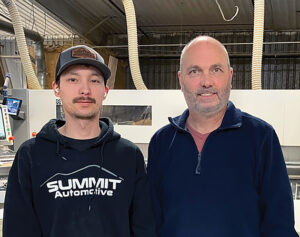Sumit Mahajan recently joined a new Enterprise Minnesota Peer Council, and just a few months in, he says his company already is reaping significant benefits.
As production manager for General Label in Golden Valley, Mahajan represents one of nine manufacturers who have seized the opportunity to sharpen their operations and learn from one another.
While many of Enterprise Minnesota’s 10 other peer groups convene CEOs to discuss big-picture strategy in a wholly confidential setting, Mahajan appreciates the chance to discuss the nitty-gritty issues of the production floor, even though they come from disparate industries.
“What’s a company? A company is a group of people making something or providing a service. So, that’s the common link: We all have people, and we all have products,” he says.
As its name suggests, General Label started out in the label business. But in the 40-some years since its inception, the company evolved and now offers precision electronic printing, including membrane switch overlays and custom gaskets.
Regardless of product lineup, personnel issues remain a universal challenge, Mahajan says. General Label employs just south of 50 people and like most manufacturers is looking to hire.
“Most of my problems are related to employees. How can I motivate them? How can I form high-performing teams?” he asks, noting that all successful manufacturers strive for similar operational goals.
He’s found drawing from a collective pool of knowledge and experience to be invaluable, even when it comes to miscues.
“It’s good to learn from others’ mistakes,” Mahajan says.
For instance, he feels fortunate to have discussed his plans to roll out a KPI — key performance indicator — tracking system at General Label, only to receive a warning from fellow council members that his idea of rewarding staff for ideas could prove counterproductive.
Eric Blaha, a business growth consultant for Enterprise Minnesota who facilitates this newly-formed group’s 3½- to 4-hour monthly meetings, says the council members gelled quickly into insightful discussions.
Mahajan appreciates how the meetings typically begin with “fast burn” conversations that enable members to share pressing concerns. He spends time in advance to narrow the scope of a challenge so that the discussion will prove useful.
Kari Rusing, a business development consultant for Enterprise Minnesota, has teamed up with Blaha to form the organization’s latest ops Peer Council, and says participants often discover a compelling value proposition for their investment of time and money.
“To walk away from every meeting with a wealth of information and things to bring back and apply to your company is pretty amazing,” she says.
Meetings often follow that fast burn discussion with a presentation from a guest speaker who will discuss relevant issues, such as the principles of lean manufacturing, KPIs, measurables and accountability, tax code changes, artificial intelligence, and pending legislation that could affect businesses.
Blaha says the meetings help businesses step outside their bubbles and achieve breakthroughs.
“Manufacturers spend so much time in the same facility and in the same environment that it can be hard to see the forest for the trees. They don’t get unique and broad perspectives on how to solve problems,” Blaha says.
Rusing has found many manufacturers to be eager participants, especially coming out of the pandemic.
“People were looking for connections and conversations where they could compare stories and get advice,” she says. And that desire to share has not waned, even as conditions have improved.
“As we came off of the supply-chain issues, lead-times shortened and material wait-times shortened, it was good for operations people to compare notes to see how they were dealing with all this,” she says.
Enterprise Minnesota encourages peer council members to host site visits, where a first-hand view of other operations can make advice and feedback even more relevant.
Rusing says: “Manufacturers are proud of what they have going on. It’s always a treat for them to share that with other manufacturers and get feedback.
“Everyone’s looking for a way to improve,” she adds. “Many people tend to think of peer councils as networking. But our councils are different. Ours serve the purpose of: How can we help our manufacturers learn about each other and utilize that learning to become better companies themselves?”
“That learning journey in management and people never ends,” Rusing says. “While you may think you have the answer, there are always going to be curveballs or something to think about.”
Return to the Summer 2024 issue of Enterprise Minnesota® magazine.


